Filter by
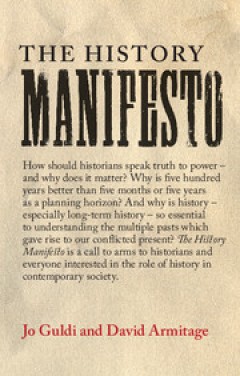
The history manifesto
How should historians speak truth to power – and why does it matter? Why is five hundred years better than five months or five years as a planning horizon? And why is history – especially long-term history – so essential to understanding the multiple pasts which gave rise to our conflicted present? The History Manifesto is a call to arms to historians and everyone interested in the role o…
- Edition
- -
- ISBN/ISSN
- 9781139923880
- Collation
- ix, 165 p. : ill
- Series Title
- -
- Call Number
- 901 GUL t

Migration, workers, and fundamental freedoms : pandemic vulnerabilities and s…
The COVID-19 pandemic resulted in a mass exodus of India’s migrant workers from the cities back to the villages. This book explores the social conditions and concerns around health, labour, migration, and gender that were thrown up as a result of this forced migration. The book examines the failings of the public health systems and the state response to address the humanitarian crisis which u…
- Edition
- -
- ISBN/ISSN
- 9781003145509
- Collation
- ix, 127 p. : ill.
- Series Title
- -
- Call Number
- 331.5440954 HAN m
Entertaining the idea : shakespeare, performance, and philosophy
To entertain an idea is to take it in, pay attention to it, give it breathing room, dwell with it for a time. The practice of entertaining ideas suggests rumination and meditation, inviting us to think of philosophy as a form of hospitality and a kind of mental theatre. In this collection, organized around key words shared by philosophy and performance, the editors suggest that Shakespeare’s …
- Edition
- -
- ISBN/ISSN
- 9781487536237
- Collation
- ix, 237 p.
- Series Title
- -
- Call Number
- 822.33 GAL e
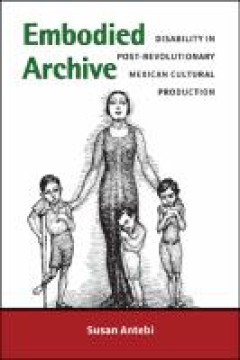
Embodied archive: disability in post-revolutionary Mexican cultural production
"Embodied Archive focuses on perceptions of disability and racial difference in Mexico’s early post-revolutionary period, from the 1920s to the 1940s. In this period, Mexican state-sponsored institutions charged with the education and health of the population sought to strengthen and improve the future of the nation, and to forge a more racially homogeneous sense of collective identity and hi…
- Edition
- -
- ISBN/ISSN
- 9780472902422
- Collation
- 283 p.: ill.
- Series Title
- Corporealities: Discourses Of Disability
- Call Number
- 305.908097209041 ANT e
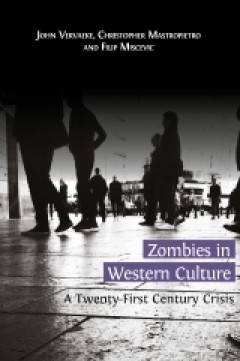
Zombies in western culture: a twenty-first century crisis
Why has the zombie become such a pervasive figure in twenty-first-century popular culture? John Vervaeke, Christopher Mastropietro and Filip Miscevic seek to answer this question by arguing that particular aspects of the zombie, common to a variety of media forms, reflect a crisis in modern Western culture. The authors examine the essential features of the zombie, including mindlessness, ugl…
- Edition
- -
- ISBN/ISSN
- 9781783743308
- Collation
- viii, 93 p. : ill. : ind. ; 24 cm
- Series Title
- -
- Call Number
- 398.21 VER z
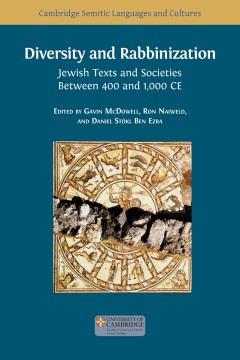
Diversity and rabbinization: jewish texts and societies between 400 and 1000 CE
This volume is dedicated to the cultural and religious diversity in Jewish communities from Late Antiquity to the Early Middle Age and the growing influence of the rabbis within these communities during the same period. Drawing on available textual and material evidence, the fourteen essays presented here, written by leading experts in their fields, span a significant chronological and geograph…
- Edition
- -
- ISBN/ISSN
- 9781783749959
- Collation
- xxiii, 474 p. : ill. : ind. ; 24 cm
- Series Title
- -
- Call Number
- 296.1 DIV d
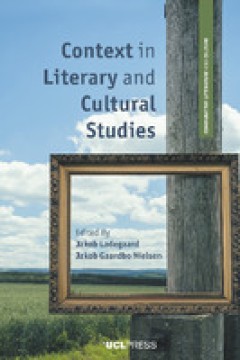
Context in literary and cultural studies
Context in Literary and Cultural Studies is an interdisciplinary volume that deals with the challenges of studying works of art and literature in their historical context today. The relationship between artworks and context has long been a central concern for aesthetic and cultural disciplines, and the question of context has been asked anew in all eras. Developments in contemporary culture and…
- Edition
- -
- ISBN/ISSN
- 9781787356245
- Collation
- XV, 241 p.
- Series Title
- -
- Call Number
- 809 CON c
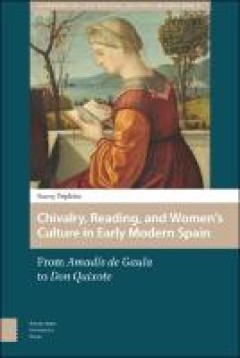
Chivalry, reading, and women's culture in early modern Spain: from Amadís de…
The Iberian chivalric romance has long been thought of as an archaic, masculine genre and its popularity as an aberration in European literary history. Chivalry, Reading, and Women’s Culture in Early Modern Spain contests this view, arguing that the surprisingly egalitarian gender politics of Spain’s most famous romance of chivalry has guaranteed it a long afterlife. Amadís de Gaula had a …
- Edition
- -
- ISBN/ISSN
- 9789048536641
- Collation
- 281 p.
- Series Title
- Gendering the Late Medieval and Early Modern World, 3
- Call Number
- 860.93522 TRI c
Understanding well-being data : improving social and cultural policy, practic…
‘Following the data’ is a now-familiar phrase in Covid-19 policy communications. Well-being data are pivotal in decisions that affect our life chances, livelihoods and quality of life. They are increasingly valuable to companies with their eyes on profit, organisations looking to make a social impact, and governments focussed on societal problems. This book follows well-being data back cent…
- Edition
- -
- ISBN/ISSN
- 9783030729370
- Collation
- xxiii, 373 p. : color, ill.
- Series Title
- -
- Call Number
- 362.1 OMA u
The value of culture : on the relationship between economics and arts
Culture manifests itself in everything human, including the ordinary business of everyday life. Culture and art have their own value, but economic values are also constrained. Art sponsorships and subsidies suggest a value that exceeds market price. So what is the real value of culture? Unlike the usual focus on formal problems, which has 'de-cultured' and 'de-moralized' the practice of economi…
- Edition
- -
- ISBN/ISSN
- 9053562I92
- Collation
- 238 p. : bnw, ill.
- Series Title
- -
- Call Number
- 338.477 KLA t
 Computer Science, Information & General Works
Computer Science, Information & General Works  Philosophy & Psychology
Philosophy & Psychology  Religion
Religion  Social Sciences
Social Sciences  Language
Language  Pure Science
Pure Science  Applied Sciences
Applied Sciences  Art & Recreation
Art & Recreation  Literature
Literature  History & Geography
History & Geography